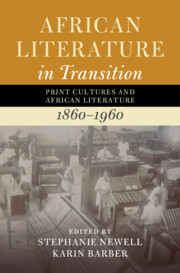Book contents
- African Literature in Transition
- African Literature in Transition
- African Literature in Transition
- Copyright page
- Contents
- Figures
- Tables
- Contributors
- Introduction
- Part I Producing Print
- Part II Readers and Audiences
- Part III New Genres
- Chapter 11 Linguistic Cohabitation and the Equivalences of Print
- Chapter 12 Autoethnographic Expression and the Politics of Educational Adaptation
- Chapter 13 Satirical Street Literature
- Chapter 14 Pioneers of the Popular
- Chapter 15 Orthographic Arguments
- Chapter 16 ‘Usefully Unofficial’ Reading
- Part IV Worlds of Print
- Index
- References
Chapter 16 - ‘Usefully Unofficial’ Reading
Onitsha Market Literature and Anglophone Print Cultures in Colonial Nigeria
from Part III - New Genres
Published online by Cambridge University Press: 23 October 2025
- African Literature in Transition
- African Literature in Transition
- African Literature in Transition
- Copyright page
- Contents
- Figures
- Tables
- Contributors
- Introduction
- Part I Producing Print
- Part II Readers and Audiences
- Part III New Genres
- Chapter 11 Linguistic Cohabitation and the Equivalences of Print
- Chapter 12 Autoethnographic Expression and the Politics of Educational Adaptation
- Chapter 13 Satirical Street Literature
- Chapter 14 Pioneers of the Popular
- Chapter 15 Orthographic Arguments
- Chapter 16 ‘Usefully Unofficial’ Reading
- Part IV Worlds of Print
- Index
- References
Summary
Focusing on the proliferation of independent African-owned presses in eastern Nigeria in the 1950s and 1960s, this chapter discusses the popular pamphlets known as Onitsha market literature. The chapter asks how the upsurge in local publishing shaped readers’ ideas about literary languages and contributed to authors’ social prestige as intellectuals. The chapter describes the practicalities of pamphlet production, as well as the ways pamphleteers offered fresh conceptualisations of literary inspiration outside dominant western frameworks for works of the imagination.
Information
- Type
- Chapter
- Information
- African Literature in TransitionPrint Cultures and African Literature, 1860–1960, pp. 313 - 332Publisher: Cambridge University PressPrint publication year: 2025
References
Accessibility standard: Inaccessible, or known limited accessibility
Why this information is here
This section outlines the accessibility features of this content - including support for screen readers, full keyboard navigation and high-contrast display options. This may not be relevant for you.Accessibility Information
Content Navigation
Allows you to navigate directly to chapters, sections, or non‐text items through a linked table of contents, reducing the need for extensive scrolling.
Provides an interactive index, letting you go straight to where a term or subject appears in the text without manual searching.
Reading Order & Textual Equivalents
You will encounter all content (including footnotes, captions, etc.) in a clear, sequential flow, making it easier to follow with assistive tools like screen readers.
You get concise descriptions (for images, charts, or media clips), ensuring you do not miss crucial information when visual or audio elements are not accessible.
You get more than just short alt text: you have comprehensive text equivalents, transcripts, captions, or audio descriptions for substantial non‐text content, which is especially helpful for complex visuals or multimedia.
Visual Accessibility
You will still understand key ideas or prompts without relying solely on colour, which is especially helpful if you have colour vision deficiencies.
You benefit from high‐contrast text, which improves legibility if you have low vision or if you are reading in less‐than‐ideal lighting conditions.
